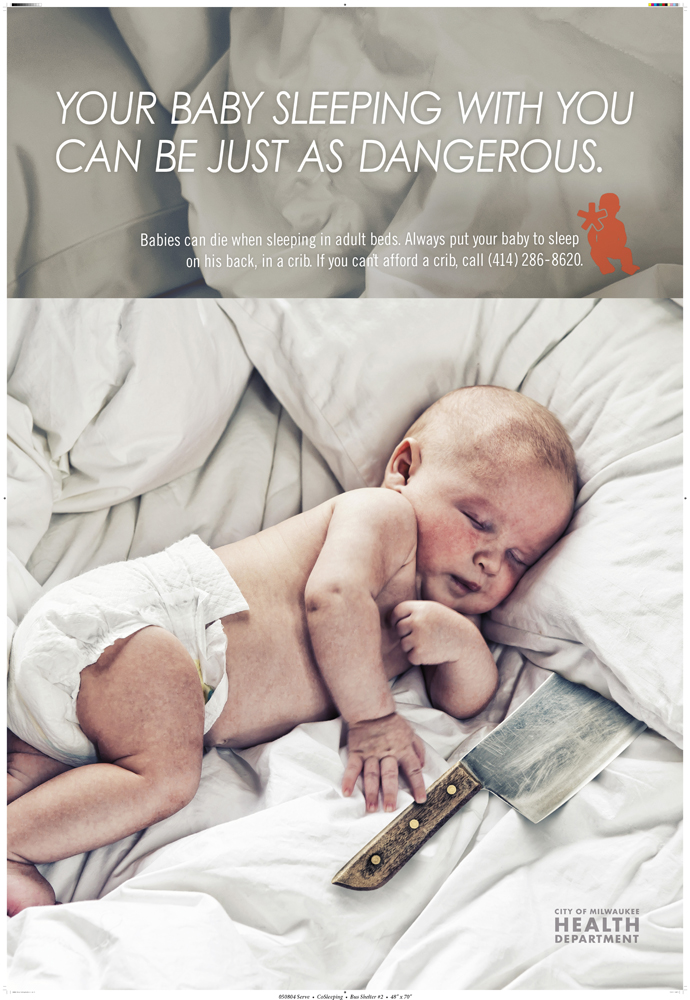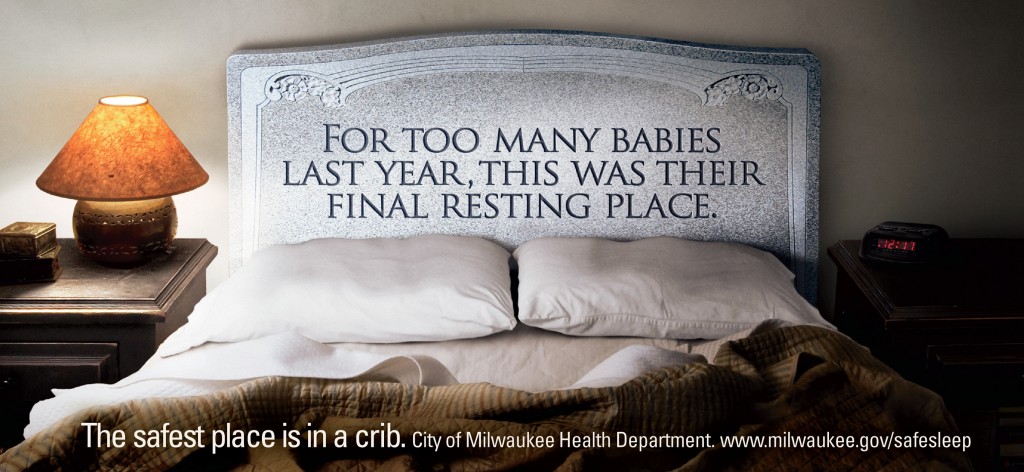 The city of Milwaukee is not a good place to be an infant. For every 1,000 babies born there, more than 10 die before their first birthday. Among black families, the number is even higher — 14 out of 1,000. The national average is about 6.5. So it’s no wonder the Milwaukee Health Department is pulling out every tool in its arsenal to curb the number of infant deaths . . . even scare tactics.
The city of Milwaukee is not a good place to be an infant. For every 1,000 babies born there, more than 10 die before their first birthday. Among black families, the number is even higher — 14 out of 1,000. The national average is about 6.5. So it’s no wonder the Milwaukee Health Department is pulling out every tool in its arsenal to curb the number of infant deaths . . . even scare tactics.
Would you put your child down for a nap next to a giant butcher knife? No? Well, why would you let your child sleep with you? They’re equally risky, the ad says. The message is clear: Choose to share a bed with your infant, and you could be risking your child’s life.
Sharing a bed with your baby does come with risks. Babies can fall between the bed and the headboard or wall. Soft blankets and pillows can suffocate infants. Parents can unwittingly roll on top of their children and crush or smother them. And a few studies suggest that bed sharing may be associated with Sudden Infant Death Syndrome (SIDS), especially among children of mothers who smoked during pregnancy (other studies, however, have failed to find a link).
Here’s one heartbreaking Milwaukee tale: On October 14, just four days after the city launched its new ad campaign, a 24-year-old mother put her daughter, 4-month-old Raneja, down for an afternoon nap. She laid the baby on her stomach in the middle of her bed, a standard box spring and mattress topped with a futon mattress, comforter and pillows. She joined her daughter about an hour later and fell asleep. When Raneja’s mom woke up at 7 pm, the baby was wedged between the wall and the head of the mattress, her face pressed into the fabric. She was dead.
 The story is impossibly tragic. But Raneja is the exception, not the norm. In fact, most babies in Milwaukee die because they were born too early, or because they have birth defects. Only 19% of the infant deaths are the result of SIDS or accidental suffocation, according to a 2010 report. And only a fraction of those deaths occurred in infants that were sharing a bed.
The story is impossibly tragic. But Raneja is the exception, not the norm. In fact, most babies in Milwaukee die because they were born too early, or because they have birth defects. Only 19% of the infant deaths are the result of SIDS or accidental suffocation, according to a 2010 report. And only a fraction of those deaths occurred in infants that were sharing a bed.
What the ads don’t tell you is that bed sharing comes with benefits as well as risks. Babies get nourishment, warmth, and comfort from their mothers. Spending time close together helps mother and child bond and promotes breastfeeding. There’s scientific evidence to back this up. (See here and here.) And for some parents, bed sharing just makes sense. The whole family sleeps better.
And there are ways to make bed sharing safer. Firm mattresses are better than soft ones. Fluffy pillows and comforters — suffocation hazards — should be removed, and the bed should be pushed away from the wall. And, this may seem obvious, but parents shouldn’t sleep with their infants after drinking or taking drugs.
So why has Milwaukee decided to send a black and white message when there are so many shades of gray? I like the way James McKenna, an anthropologist who runs co-sleeping laboratory at Notre Dame, explained the issue on NPR in 2009.
“This is the argument made, that some people are not able to arrange a safe bed-sharing environment for their babies, so no one should be permitted to do it, or we can’t have a mixed message. But that’s just irrelevant, whether it’s a mixed message or not. The point is, it’s absolutely biologically compelling to sleep with your baby, and it’s a legitimate choice for parents to make should they be able to do it safely.”
I asked my friend, Lea Wolf, a doula in Madison, Wisconsin, for her take. She told me that co-sleeping, at least some of the time, usually makes sense for mothers who are breastfeeding. “We talk with families about safe cosleeping and what that entails – and what unsafe cosleeping looks like. It’s unrealistic to be black and white with this issue – the reality is that all parents fall asleep with their babies at some time or another, whether they intend to cosleep or not. The [Milwaukee] campaign, the way it is presented, is more likely to drive people away from safe cosleeping and to their recliners, which is pointedly unsafe,” she says.
Enough with the over-simplified public health messages. Isn’t it time to give parents some credit? Let’s trade in the scare tactics for a campaign that explains the real risks and benefits. Let’s assume that parents grasp nuance.
**
Image credits: Milwaukee Department of Health
Experts have been arguing back and forth for centuries as to whether it is safer for babies to sleep with their parents or in a crib (see “Dream Babies: Childcare Advice from John Locke to Gina Ford, by Christina Hardyment, http://www.amazon.com/Dream-Babies-Childcare-Advice-Locke/dp/0711227993.) The fact is that sleeping with your baby is a wonderful feeling and really relaxing for both baby and parent. Yes, there is the risk that the baby will be smothered on pillows or roll out of the bed. There is no need however to strike terror into the hearts of mothers (as this campaign aims to do.)
Well said Cassie. This seems to be a common tactic among advocacy groups–we’ve got to scare them to get their attention.
Lisa M. Schwartz and Steven Woloshin wrote a paper about this a few years ago, The Case for Letting Information Speak for Itself.
http://www.acponline.org/clinical_information/journals_publications/ecp/marapr01/schwartz.htm
I really do not think that the parents who have this happen to them CAN grasp nuance. If these were people who had the means to educate themselves, this wouldn’t happen. Most of these families aren’t even getting basic pre-natal care, let alone doulas or lactation consultants. Babies in Milwaukee are DYING. Sometimes it just has to be black or white. And those of us who know what a co-sleeper is, know what a boppy pillow is, know who Dr. Sears is and had the luxury of a lactation consultant so we could nurse our infants as we slept, we should know that these ads are not aimed at us, so there’s no point in taking offense to it.
” Only 19% of the infant deaths are the result of SIDS or accidental suffocation”
This seems pretty significant to me!
Annie, 19% is significant! But how many of those babies are suffocating or dying of SIDS in their own cribs? The question is what fraction of those cases are cases in which the bed sharing was to blame (I couldn’t find this info). And 19% isn’t as significant as the 53% that are dying because they were born premature. And as you probably know, there are a number of risk factors for preterm labor that are under the mother’s control — STDs, smoking, and alcohol use come to mind. Why not launch a public health campaign aimed at these targets?
And, as Jeri pointed out, many pregnant women in Milwaukee aren’t getting the care they need. I suspect that spending money on prenatal care and education might have a bigger impact on infant mortality than a campaign aimed at cosleeping — especially one designed to instill fear rather than empower.
@Jeri – agreed.
Having read up on the Empty Cradle resources on JSOnline, it’s clear this ad isn’t targeting US (people who can afford Internet access for example). Read the fine print on the ad – “if you cannot afford a crib call us.” The Milwaukee task force report suggested that a significant factor in the SIDS rate was in fact unsafe bedsharing and also putting babies to sleep unattended on couches and chairs. Also the population this ad is targeting is likely to be disqualified from co-sleeping due to any number of issues (premature birth, smoking, alcohol use, drug use, etc.).
I like your article as it is far more reasonable and thoughtful than most of the “OMG co-sleeping good, advertisement bad!” responses I’ve seen. But I wish the bigger issue – that babies and parents in Milwaukee are in a crisis – was more the focus of the conversation.
PS. I linked to your post here:
http://www.troublesometots.com/2011/safe-baby-sleep-or-hatchet-job/
Here’s an idea for all the now-banned drop-side cribs in the USA that caused so many infant deaths: Take the sides off and turn them into cosleepers for needy families.
While you’re at it, fund smoking cessation programs, alcohol and drug rehab & education and lactation consultants for all. Oh, wait – the USA has no public health system, right? You’re f*cked then. Keep doing what you’re doing Milwaukee, and accept corporate sponsorship from crib manufacturers. It’s not like dead babies amongst low socio-economic families harms your economy, anyway.